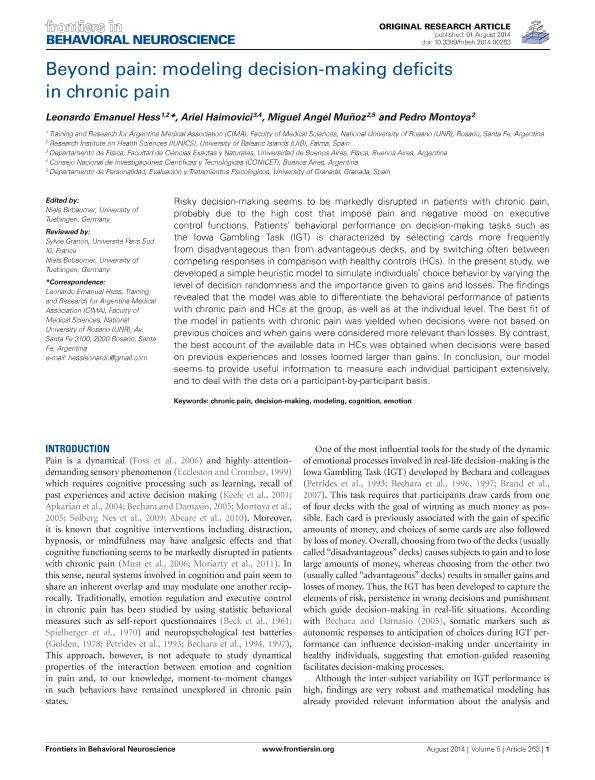Mostrar el registro sencillo del ítem
dc.contributor.author
Hess, Leonardo Emanuel

dc.contributor.author
Haimovici, Ariel

dc.contributor.author
Muñoz, Miguel Angel
dc.contributor.author
Montoya, Pedro
dc.date.available
2019-09-25T21:49:47Z
dc.date.issued
2014-08
dc.identifier.citation
Hess, Leonardo Emanuel; Haimovici, Ariel; Muñoz, Miguel Angel ; Montoya, Pedro; Beyond pain: Modeling decision-making deficits in chronic pain; Frontiers Research Foundation; Frontiers in Behavioral Neuroscience; 8; AUG; 8-2014; 1-8
dc.identifier.issn
1662-5153
dc.identifier.uri
http://hdl.handle.net/11336/84493
dc.description.abstract
Risky decision-making seems to be markedly disrupted in patients with chronic pain, probably due to the high cost that impose pain and negative mood on executive control functions. Patients' behavioral performance on decision-making tasks such as the Iowa Gambling Task (IGT) is characterized by selecting cards more frequently from disadvantageous than from advantageous decks, and by switching often between competing responses in comparison with healthy controls (HCs). In the present study, we developed a simple heuristic model to simulate individuals' choice behavior by varying the level of decision randomness and the importance given to gains and losses. The findings revealed that the model was able to differentiate the behavioral performance of patients with chronic pain and HCs at the group, as well as at the individual level. The best fit of the model in patients with chronic pain was yielded when decisions were not based on previous choices and when gains were considered more relevant than losses. By contrast, the best account of the available data in HCs was obtained when decisions were based on previous experiences and losses loomed larger than gains. In conclusion, our model seems to provide useful information to measure each individual participant extensively, and to deal with the data on a participant-by-participant basis.
dc.format
application/pdf
dc.language.iso
eng
dc.publisher
Frontiers Research Foundation

dc.rights
info:eu-repo/semantics/openAccess
dc.rights.uri
https://creativecommons.org/licenses/by-nc-sa/2.5/ar/
dc.subject
CHRONIC PAIN
dc.subject
COGNITION
dc.subject
DECISION-MAKING
dc.subject
EMOTION
dc.subject
MODELING
dc.subject.classification
Psicología especial

dc.subject.classification
Psicología

dc.subject.classification
CIENCIAS SOCIALES

dc.title
Beyond pain: Modeling decision-making deficits in chronic pain
dc.type
info:eu-repo/semantics/article
dc.type
info:ar-repo/semantics/artículo
dc.type
info:eu-repo/semantics/publishedVersion
dc.date.updated
2019-09-24T12:52:20Z
dc.journal.volume
8
dc.journal.number
AUG
dc.journal.pagination
1-8
dc.journal.pais
Suiza

dc.description.fil
Fil: Hess, Leonardo Emanuel. Universidad Nacional de Rosario. Facultad de Ciencias Médicas; Argentina
dc.description.fil
Fil: Haimovici, Ariel. Universidad de Buenos Aires. Facultad de Ciencias Exactas y Naturales. Departamento de Física; Argentina. Consejo Nacional de Investigaciones Científicas y Técnicas; Argentina
dc.description.fil
Fil: Muñoz, Miguel Angel. Universidad de las Islas Baleares; España. Universidad de Granada; España
dc.description.fil
Fil: Montoya, Pedro. Universidad de las Islas Baleares; España
dc.journal.title
Frontiers in Behavioral Neuroscience
dc.relation.alternativeid
info:eu-repo/semantics/altIdentifier/doi/http://dx.doi.org/10.3389/fnbeh.2014.00263
dc.relation.alternativeid
info:eu-repo/semantics/altIdentifier/url/https://www.frontiersin.org/articles/10.3389/fnbeh.2014.00263/full
Archivos asociados
